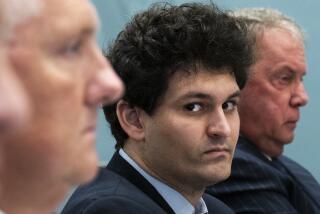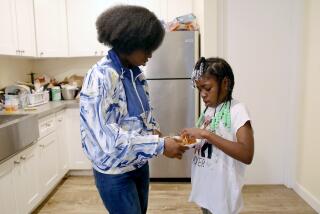Microcredit Idea Inspires Programs Worldwide
Nobel Peace Prize laureate Muhammad Yunus was trained in economics but is something of an engineer in his day-to-day work, building bridges between the developed and developing worlds.
When a group of technology executives was invited to meet the Bangladeshi economist at a Seattle-area private club, Craig McCaw was the only big name who showed up. By the end of breakfast, the cellphone entrepreneur was hooked.
Convinced that he might have discovered a way to deliver low-cost mobile phone service to the world’s poorest people, McCaw provided $2 million in seed money to launch the Grameen Technology Center five years ago, recalled Peter Bladin, the former Microsoft Corp. executive who heads the Seattle organization.
In partnership with Yunus’ Grameen Foundation -- Grameen translates into “rural” or “village” in the Bangla language -- the center has developed a mobile phone “business in a box” that it sells to poor Africans for $175 apiece.
The Grameen Technology Center is one of many development programs across the globe inspired by Yunus, the U.S.educated “Banker to the Poor” who was awarded the Nobel Peace Prize on Friday for helping millions of people work themselves out of poverty by lending them $10 or $20 at a time.
“He proved that poor people are creditworthy, are as good as you and I and in some cases are better than you and I,” Bladin said by telephone from India. “Look at Grameen Bank. It has over 6 million borrowers, and it’s never had a piece of paper pass between the borrowers and the bank. And it has a 98% repayment rate.”
In the beginning, Yunus labored in relative obscurity. But three decades after the founding of Grameen Bank, his work has attracted the support of world leaders, development experts and entrepreneurs such as McCaw and Microsoft founder Bill Gates.
“He’s broken so many rules to allow for the empowerment of the very poor, and so few people know about his work,” said Sam Daley-Harris, head of the Microcredit Summit Campaign. “That makes it all the more brilliant that the prize has been awarded to him.”
The campaign, a nonprofit public-private partnership, has set a goal of delivering microcredit to 100 million of the world’s poorest people by 2015.
Before launching their own microcredit program, Gates and his wife, Melinda, invited Yunus to Seattle to discuss his work in Bangladesh. Since then, their foundation has given $40 million to programs providing loans, insurance and other financial instruments to the poor. Last fall, the foundation awarded $1.5 million to Yunus’ foundation.
One program at the Gates foundation provides “smart” bank cards to poor female entrepreneurs in Malawi, an African country with a high HIV-AIDS infection rate. Distribution of the cards, which use thumbprint technology, has made it harder for relatives of a dead husband to steal a widow’s money.
Jonathan Morduch, a New York University professor and coauthor of “The Economics of Microfinance,” said Yunus broadened support for international development by demonstrating the potential for lending profitably to the poor.
“You’ve got people like Bill Clinton embracing microfinance from the left because of the focus on poverty. And in Congress, some of the strongest supporters are conservative Republicans like Henry Hyde,” he said, referring to the Illinois legislator.
Tech entrepreneurs also have been attracted to the idea of giving poor people the financial and technological tools to help themselves. In 2005, EBay Inc. founder Pierre Omidyar and his wife, Pam, announced plans to team with their alma mater, Tufts University, to invest $100 million for international microfinance.
Morduch said Yunus had triggered “healthy tensions” within the microfinance community by insisting that his programs serve only the poorest of the poor, who tend to be more expensive and less profitable to serve. Some large banks, for example, are getting into the microloan business in poor countries but are focusing on small and mid-size businesses because the returns are greater.
“Some organizations are able to have a win-win vision of both making commercially meaningful profits and also serving the poor, but it remains a challenge going forward,” Morduch said.
Bladin of the Grameen Technology Center said his greatest challenge was obtaining the seed money to develop and launch programs, which can be costly to administer because they are in remote locations.
In Uganda, where the center has helped pay for 6,000 phone centers, villagers use microcredit to buy cellphone start-up packages and sell minutes to their neighbors. This has enabled farmers to check produce prices and has helped shopkeepers keep their shelves restocked. In one village, the locals gathered at the phone center each evening and pooled their money so they could call into radio talk shows.
“This became their information center and part of their social life,” Bladin said of the phone business.
More to Read
Sign up for Essential California
The most important California stories and recommendations in your inbox every morning.
You may occasionally receive promotional content from the Los Angeles Times.









